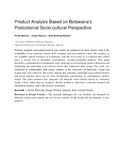Product analysis based on Botswana's postcolonial socio-cultural perspective

View/
Date
2007Author
Moalosi, R.
Popovic, V.
Hickling-Hudson, A.R.
Publisher
Chinese Institute of Design, http://www.ijdesign.orgRights
Content licensed under the Creative Commons Attribution-Noncommercial - NoDevris 2.5 LicenseRights holder
(2007) Moalosi, Popovic & Hickling-Hudson.Type
Published ArticleMetadata
Show full item recordAbstract
Products designed and manufactured in any country are influenced by local factors, such as the availability of raw materials, human skills, tradition, and socio-cultural values. The tendency to use available natural resources is in harmony with the eco-system. It is expected that culture plays a crucial role in designing contemporary, socially-acceptable products. This paper describes a comprehensive experimental study analysing several products made in Botswana and identifying the underlying socio-cultural factors that influenced their design. The study was conducted in collaboration with design students at the University of Botswana. Visual and textual data were collected. The results indicate that materials, emotional socio-cultural factors, and social practices have not yet been incorporated convincingly in contemporary product design. The paper proposes how designers can integrate socio-cultural factors by 'conscious design efforts' rather than by 'accident,' thereby leading to innovative, culturally-oriented and cherishable products with wider product acceptance.
